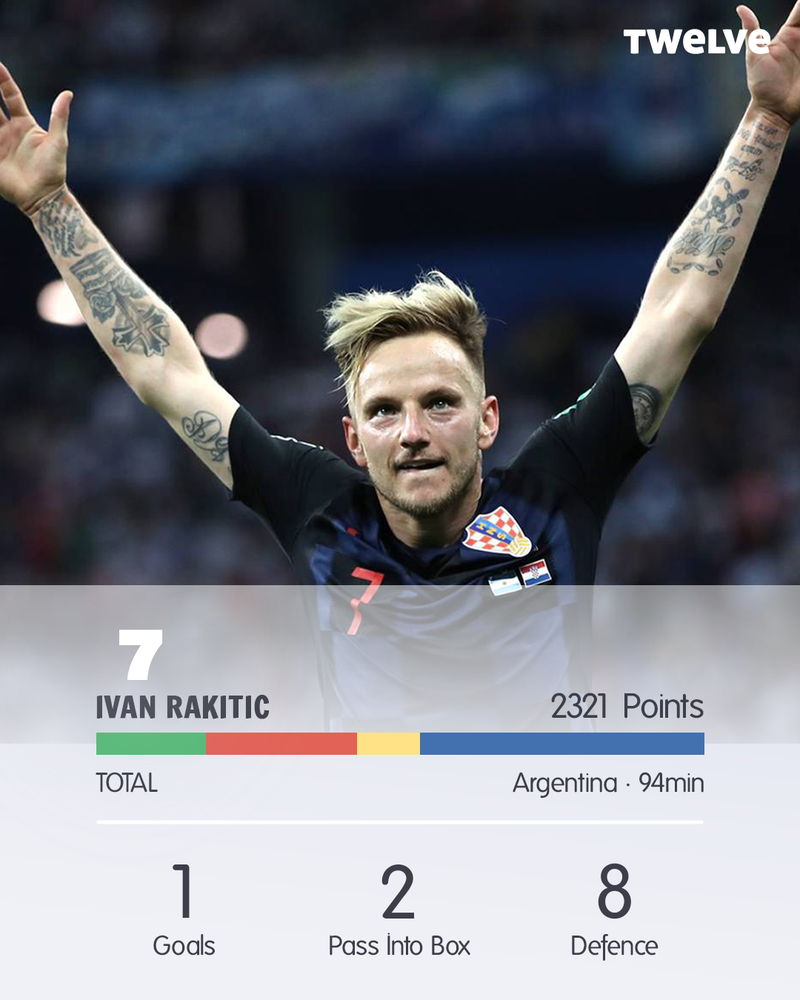
Only six nations in the last 32 years have reached the knockout stage of the World Cup without conceding a goal. Another one could be Croatia this year. I couldn't have imagined things would turn out to be exactly as they are now.
The whole qualification process was strange for Croatia, especially in the last few games. I still remember watching the game in my hometown against Finland, which was supposed to be an easy three-pointer. Mandzukic scored in the 57th minute, but Soiri banged in the leveller in the 90th minute.
Next match was against Ukraine. It was the last round of the qualification process and 'Vatreni' needed a win to make the playoff. After the draw against Finland, the Croatian FA sacked Ante Cacic and things started to look irreparable. The chaos and disorder in Croatia's game was obvious.
In that game against Finland, only Luka Modric showed the willingness to play and compete. Others were not interested and it looked like we were going to miss the World Cup, and not long after we were decent at Euro 2016.
But the FA's decision to sack Cacic proved to be right. Zlatko Dalic took over and the rest is history. After years of waiting, Croatia finally has a squad capable of something big, and they confirmed that after only two group stage games.
Not only do they look harmonious on the pitch, but they finally play in a clear-set system that has it's own essence. Everything before that was an over-reliance on pure individualism. The majestic win against Argentina proved exactly that, but everything started with Nigeria and game no.1 in the World Cup group stage for Croatia.
Despite Dalic leading the squad through the win against Ukraine in the last round of qualification and two successful games against Greece in the playoff, Croatia came into the tournament in Russia with a couple of question marks. They mostly revolved around how Dalic would take to his task. The sheer number of world class players, especially in midfield, meant expectations were always going to be high.
Six months to think about group stage opponents proved to be enough for Dalic and his plans. The first game of the tournament is always hardest. Nervousness is present, people expect to start off with a win, and maybe by a big goal margin. Nevertheless, Dalic knew exactly what great strengths Nigeria possess; a counter-attacking game and pace.
Croatia made a crucial change from previous games. Having previously played Luka Modric in an advanced position behind the striker, in a no.10 role, Dalic moved the Real Madrid midfielder deeper and paired him alongside Ivan Rakitic. The guy who came in was Andrej Kramaric, meaning a more direct approach.
The tactical battle did not decide the game in a direct way - Etebo’s own goal and Modric scoring a penalty did that - but we could see Croatia neutralize the key attacking weapons of the Super Eagles. Dalic did this by getting both fullbacks (Strinic and Vrsaljko) higher up into advanced positions in attacking phases, while bringing back the wingers Perisic and Rebic in the phase of defence.
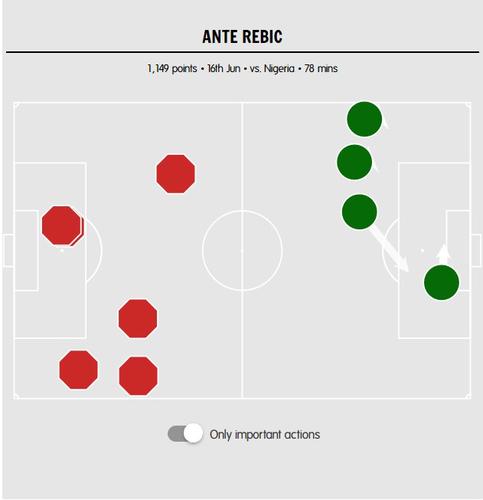
That can be perfectly seen in Twelve’s graphical representation where both Perisic and Rebic recorded a significant number of ball recoveries in deeper areas while helping their fullback to prevent Nigeria’s counter attacks.
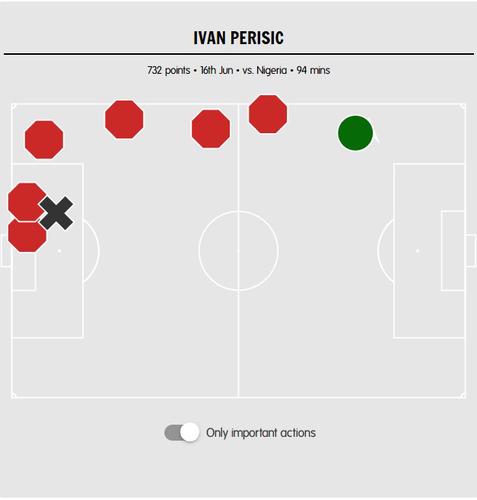
It's also worth mentioning the often disputed Dejan Lovren. Liverpool stopper was the best Croatian defender per Twelve with 937 defence points. Lovren was also creating problems with compactness to the Super Eagles, when he brought the ball out of defence and found wingers or Mandzukic the target man high up in the field.
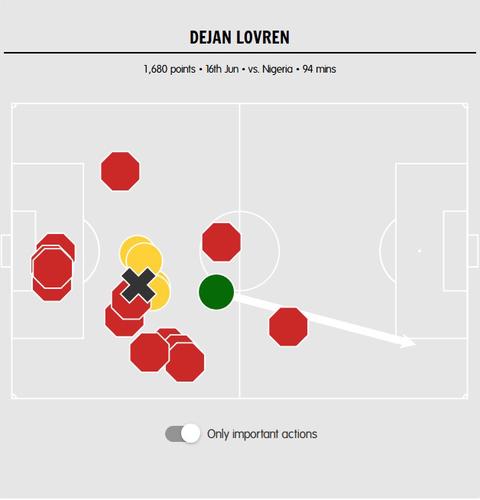
The third best player on the pitch was Ivan Rakitic, but I’m going to write about him in the context of something else. Everything about Croatia's win against Argentina has been covered in Roy Nemer's article on how Messi and Argentina were outclassed by Croatia’s midfield. I will try to explain how Rakitic went from being the weakest link of the Croatian national team to the basis of Dalic’s game plan in almost every Croatian match.
The previous manager, Ante Cacic, wasn’t a strong tactician and relied on individualism within the team. Almost every Croatian match was painful while waiting for a moment of brilliance from Modric and co. One of Cacic's decisions was to move Rakitic into a more advanced position behind the strikers and utilize him as the main playmaker.
Cacic defended his decision by saying Rakitic played a similar role in Sevilla, but that was never the case. Sevilla played with a deep block and a fast transition, where the first pass once the ball was won would go to him, and he would look for strikers or pacey wingers with his almost perfect diagonal passes. After he was moved to the no.10 role, he vanished.
Nor was he part of building attacks, and nor he was useful in a defensive phase, and from that position, he wasn't even posing a threat to the opposition goalkeeper. Rampant Rakitic who marked Day 8 at the World Cup in Russia had become a victim of his own manager. Cacic shut down his main abilities which are the vision, surgically precise long passes and dangerous shots from distance, as he was condemned to playing with his back to goal.
Thankfully, his and the whole nation's saviour was Zlatko Dalic. He whispered into Rakitic’s ear and planted an idea that would fully transform not only Barcelona's deep-lying playmaker but the whole Croatian team. Not many people know this, but the decisions made by Cacic almost lead to Rakitic stopping playing for the national team. Before the Ukraine game, he was on the verge of retiring from the national shirt because of the criticism being given to him.
After Croatia won against Ukraine in Kiev, Dalic thoroughly explained what happened before that decisive match.
"Before Ukraine game, there was no time for too much work and analysis. Only two days before the match in Kiev, I’ve met the team”, he said. “I had two big problems: I did not know a bit about the Ukrainians, I did not know how the players will welcome me and what I would really do in two days. We only had one training at our disposal. The only thing left me was to detect the problems with the players, as the team atmosphere was bad.”
He revealed what the problem was with Rakitic.
"I asked him how he was, and he was rather negative, he told me he could not play, he did not have that old vision on the field, and he was missing out on the details, I felt pessimism and I started to think of another solution in my head. I told him we would change his position because he did not play the position he was used to. He immediately responded positively, and told me that he was ready for the match the next morning before the morning meeting.”
Dalic played Rakitic alongside Badelj in a deep midfield role as part of the 4-2-3-1 formation while Modric was roaming free in the no.10 role. Rakitic finally had the opportunity to turn his head towards the opposition goal with the ball at his feet, alowing him to analyze the situation and choose a perfect solution to continue an attack.
Simultaneously, when in good shape, he’s rather clinical in his defensive tasks, timely in tackles and secure on the ball when in possession too. Looking at this season in Barcelona, Rakitic was Valverde’s main man with the most appearances in the Blaugrana shirt (55), which was even one more than Lionel Messi.
Per Twelve, Rakitic was the best-rated player in the match against Argentina. To confirm everything I wrote earlier, it is enough to look at the graphic presentation of Rakitic's performance by Twelve in matches against Nigeria and Argentina where you can see balanced numbers both in the attack and defence sections.
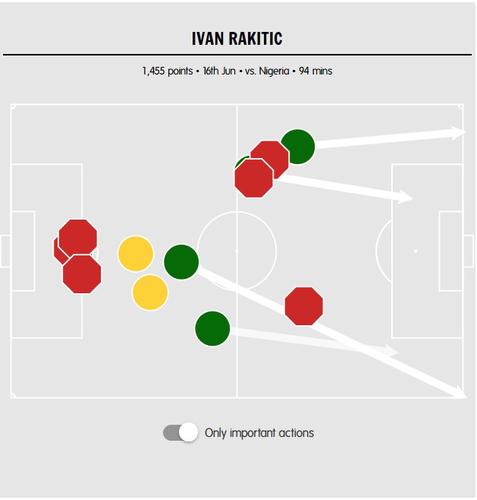
It’s clear that against the African side Ivan played more offensively with 789 attack points, in comparison to the Argentina game where he was primarily defensive oriented with 853 defence points. But he also scored the third goal and hit the crossbar, and so won Twelve’s ‘Man of the match’ award.
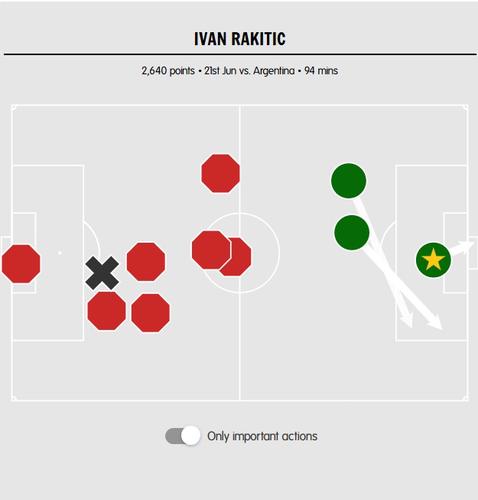
Since Luka Modric is undoubtedly a world-class midfielder and it is not necessary to spend words and compliments on him, Rakitic's resurrection is the real proof of the work and change in the team that came upon the arrival of Zlatko Dalic.
In my opinion, the Croatian side is not even a ‘dark horse’ as it was called, but rather a serious team with clearly defined goals and tasks. One who prefers playing against bigger sides, rather than against underdogs where they struggle to make an impact in the attacking phase and create chances from open play.
Therefore, if the coming draw will suit them in that way, only the sky is the limit. This means Croatia will likely want to get France rather than Denmark in the next stage of World Cup which, at first, can sound absurd. But objectively it's easier for them to play reactive football in which you must wait and provoke the opposition's mistakes, rather than creating chances from possession play. On this front, Croatia has shown it is vulnerable and still not up to the task.
Comments